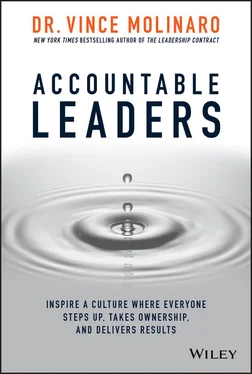You deserve better. We all deserve better. However, changing things means that you will need to be a better and more accountable leader. We will all need to be better and more accountable leaders. Why? Just look at the daily headlines or the newsfeeds on your smartphone. What do you see? Far too many stories of prominent leaders embroiled in scandal, corruption, sexual harassment, demonstrating unacceptable and even unethical behavior. Whether they are corporate CEOs, politicians, or other prominent figures, there are many disgraceful examples of leadership. These stories happen so often that we don’t even notice anymore. We have become conditioned to accept this as the norm. Well, it’s not—and we need to hold all leaders to a higher standard of behavior. You need to hold yourself to a higher standard of behavior.
Our experience with teams isn’t much better. Research shows that only three in 10 employees believe that their co-workers are committed to doing quality work. 1Most employees do the bare minimum to get by. We need to improve the quality and accountability of teams.
While business leaders talk about the importance of corporate culture, the sad reality is that very few of them have created compelling ones. research estimates that only 15 percent of companies have the culture they need to succeed. 2If an organization can’t build an inspiring culture, it will not be able to attract and retain the best talent in their industry or drive sustained business results.
We must do better, and this book will show you how.
Twenty-Five Countries and 80 Cities—the Story Is the Same
I spend a lot of time talking to people about leadership. I’ve traveled to 25 countries and about 80 cities in the last few years. In that time, I conducted hundreds of presentations, speeches, and media interviews. I’ve met with senior executives, boards, leaders at all levels, and employees. During my travels, I have also had the incredible experience of touching down in a city or country that was in the middle of a significant leadership story.
For example, on one business trip, I landed in São Paulo on a sunny Sunday morning. Little did I know that on that day, an estimated five million Brazilians would take to the streets to protest their corrupt political and corporate leaders. On another business trip, I arrived in the United Kingdom a few weeks after the initial Brexit vote. People were still bewildered by what had happened and were concerned about their future. I traveled to Madrid when the country was dealing with a crisis in government. Spaniards were at their wits’ end with the lack of leadership shown by their politicians. I traveled to many cities in the United States during the 2016 presidential election. Many Americans kept asking, “How did we get here?” After the election, many I spoke to asked, “Now what are we going to do?” As worried as people were, I’m sure no one could have predicted the kind of leadership style that President Trump would unleash on the world. Since he’s been in office, everyone has had a front-row seat to see how he leads every day. A day doesn’t pass when someone asks me to comment on U.S. President Donald Trump’s leadership—everyone is trying to make sense of his divisive and confrontational approach to leading the world’s most powerful country.
On another business trip, I was in the city of San Juan to see Puerto Ricans in the streets protesting the corruption in their government. The country was in turmoil. I then witnessed the celebrations when their governor stepped down in response to the protests. In all my discussions, as people reflected on these leadership stories, many were left wondering: “Is this what it means to be a leader?”
I arrived in New Zealand shortly after the tragic massacre of innocent people in Christchurch. We all witnessed the inspirational leadership of Prime Minister Jacinda Ardern as she led her country through its grief. I was struck by how her leadership resonated with so many people around the world. Many proclaimed that she was an example of the kind of leader we need in the future—one who can bring integrity, resolve, and compassion to her leadership role and do it when it mattered most. Unfortunately, in my travels, examples like Prime Minister Ardern are the exception. There have been far more stories of bad, inept, and uninspiring leadership.
I encountered other compelling leadership stories when I traveled to Chile, Germany, Italy, Panamá, Singapore, Australia, and other countries. Something interesting also happened during those trips. When people found out I was Canadian, many said how lucky I was to have Prime Minister Justin Trudeau as my political leader. It was immediately clear to me that he had made his mark on the world stage in his early days as prime minister. I was also really struck by these comments. When I asked why they thought Canadians were lucky to have him as their leader, the answer was unanimous: “Well, because he’s so good looking!” Then I would respond, “What does that have to do with being a good leader?” It’s important to note that when he was first elected as Canada’s prime minister, he was an inspiration to many. But over time, he was involved in several scandals that left many questioning his judgment and integrity as a leader. He was fortunate to be re-elected as prime minister in the fall of 2019, but this time with only a minority government. Canadians sent him a message: They were expecting more from him as a leader. If he chooses, he now has a second chance to redefine how he leads in a way that restores the faith and hope that so many Canadians had in him when he first took office in 2015.
During all these trips I was on the ground speaking to regular people like you and me. I was there to talk about leadership accountability. It was a good thing because, given the events taking place in real time in their countries, it was the only topic people wanted to discuss. Most of the time, I felt more like a foreign correspondent for the BBC or CNN than a leadership adviser. I heard a lot about people’s frustrations and disappointment with their leaders, their teams, and the cultures of their organizations. I also sensed their yearning for something better and more inspirational. It is clear to me that we are all desperate for exceptional leadership in our world and our organizations.
What I have learned from all these experiences is that people are fed up. They are tired of being led by mediocre leaders, working on terrible teams, or being part of organizations with uninspiring cultures. Listening to people repeatedly vent and complain about their frustrations, I find myself asking: Is anyone happy? Are you happy?
Of course, some of us have had the good fortune to be led by great leaders. Some of us have been part of terrific teams and organizations with compelling cultures. Over my career, I have been lucky to be led by some great leaders. I have been part of some fantastic teams. I have also been in companies with inspiring cultures. Here’s what these experiences have taught me. When you work for a great leader, you feel like you are at your best. When you are on a fantastic team, you feel safe and confident because everyone has your back. When you are part of an organization with an inspiring culture, you feel a powerful sense of unity and share a collective purpose. If you are lucky enough to experience all three, then your work brings you joy and meaning. It’s fun, exciting, and even life-affirming.
I’ve also learned that these great experiences can ruin you forever. What I mean is that once you’ve seen what great is like, it’s hard to put up with the bad, the mediocre, and the uninspiring. You’ve experienced good or even great, so you know that something better is indeed possible. At the same time, I’ve seen the price people have paid by working with a dreadful manager, being on a terrible team, or part of an organization with a toxic culture. Some of these people have never had a great experience in their professional lives. They do not even know that something better is possible. As a result, whenever I have found myself in situations that were downright awful, I worked hard to try to change them. And if I couldn’t, I left the organization. Why? Simply because I have come to learn that life is too short to spend it being miserable at work.
Читать дальше












